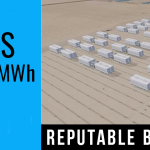
Legislation recently introduced in the U.S. House that would expand the federal solar investment tax credit (ITC) to energy storage technologies has gained the backing of major trade groups representing the solar, hydropower, and wind sectors.
The Energy Storage Tax Incentive and Deployment Act (H.R. 2096), introduced on April 4 by Reps. Mike Doyle (D-Pa.), Earl Blumenauer (D-Ore.), and Linda Sanchez (D-Calif.), would amend Section 48 and 25D of the Internal Revenue Code to add all forms of energy storage of more than 5 kWh, including batteries, compressed air, pumped hydropower, hydrogen storage (including hydrolysis), thermal energy storage, regenerative fuel cells, flywheels, capacitors, superconducting magnets, and others. The measure matches legislation introduced last year in the House and Senate (S. 1868 and H.R. 4649). While both measures were referred to committees, they were never heard.
Under current law, energy storage can only qualify for the ITC when integrated with ITC-eligible solar resources under a narrow set of conditions and subject to recapture risks. But according to the Energy Storage Association, these conditions “create tremendous uncertainty for investors.”
The group argues that numerous energy technologies—fuel cells, solar power, microturbines, and combined heat and power—can access the ITC, but that the narrow application of energy storage allowed by IRS rules prevents non-ITC-eligible resources (such as wind and natural gas) from deriving the same investment benefit as solar power. “Clarifying eligibility of the ITC for energy storage will create a level playing field across electric grid technologies, improve business certainty, and allow energy storage to pair with any type of generation asset. Doing so will enhance grid efficiency and resilience while creating more jobs and capital formation,” it said on April 4.
The Joint Committee on Taxation in 2017 suggested that storage eligibility for the ITC could create a tax expenditure of about $300 million over 10 years. The Section 48 ITC, which applies to “business investment energy storage,” is scheduled to begin phasing down from 30% in December 2019 to 26% in 2020, 22% in 2021, and 10% from the beginning of 2022. The Section 25D ITC, which applies to residential storage and is currently 30% in 2019, will fully phase out in 2022.
In an April 9 letter, nine environmental, citizen, and trade groups—including from nearly all renewable power sectors—urged House leaders to include the bill in energy tax extenders legislation. “H.R. 2096 would resolve the uncertainty facing companies who seek to utilize the ITC for energy storage, spurring greater investment and creating jobs while extending the benefits of energy storage deployment among a wider diversity of technologies and industries. Those deployments in turn will accelerate the transition to clean energy and position the U.S. as a global leader in energy storage technology,” they said.
Click Here to Read Full Article





